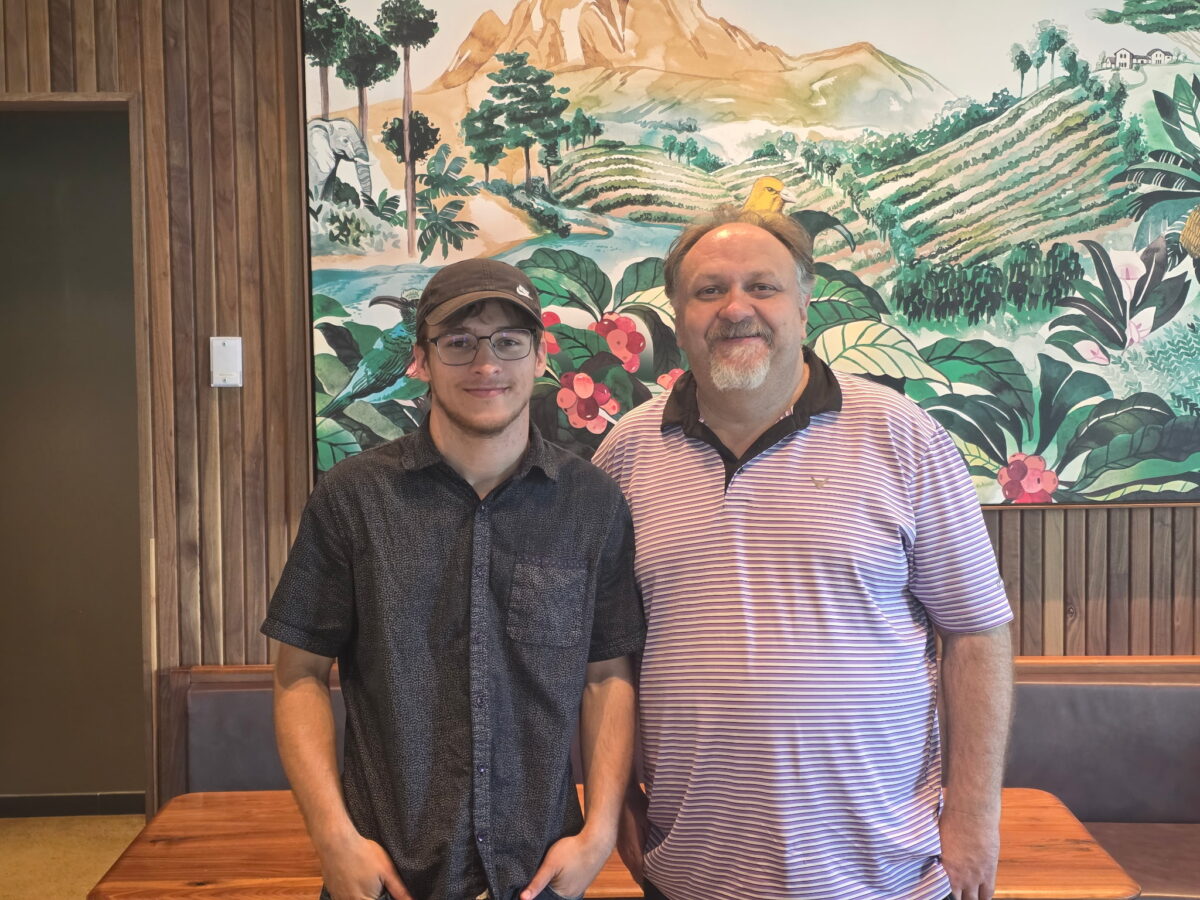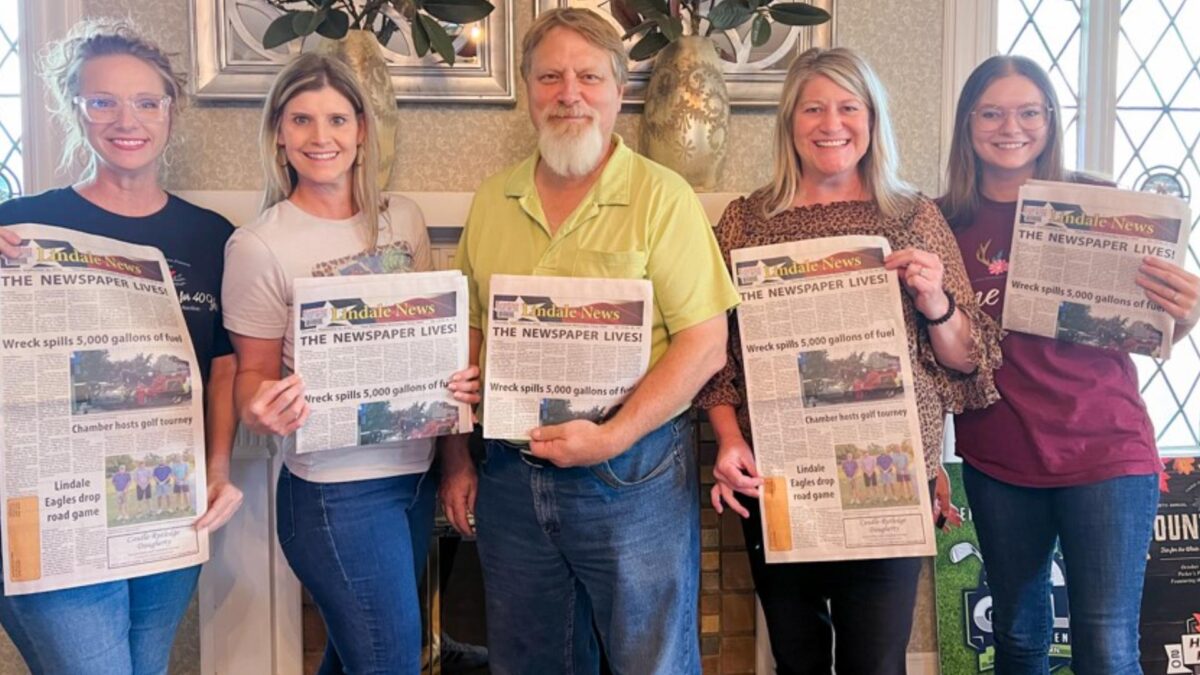HAELEY CARPENTER/Texas Center for Community Journalism
Community newspapers do more than just report the news. They connect communities by building trust and fostering relationships.
When the newspapers around Bullard, Texas closed in 2018, the community suffered.
Luckily, Shawn Larson has a plan to change that.
A year ago, Larson was driving through the area and saw a billboard for recent high school graduates and thought that is the kind of thing you would read in a newspaper. He then made the discovery that there were no newspapers to cover anything, much less the local graduates.
He has created ETX Bell with the help and support of his family. The news service will be based in Bullard, but will cover areas from Loop 49 to Jacksonville. The name comes from looking at those areas on a map.
“My wife, when she was looking at the initial coverage map of what we are going to do. She saw a bell. And you know the old idea of the Newsies ringing the bell and all of that kind of stuff,” Larson said.
He has plenty of experience in journalism but missed owning his own company. He and his son Joshua are spearheading this new project and, while it is a family business now, it won’t be for long. They are actively looking to expand their team.
“The funny thing is, is anytime you lead a business or own a business, I mean, the fact is, your family is an integral part of that,” Shawn said. “In past seasons, my wife has worked for me, as you know, doing secretarial work… I don’t know that she wants to be that in this season, she’s a she’s a school bus driver, and really enjoys doing that and teaching and stuff.”
Shawn’s son, Joshua, is a motivated learner, enrolling in different certifications and teaching himself how to build media presences for clients. His role in ETX Bell is to meet community members where they are.
“We’re bringing in kind of a hybrid approach, where we’re going to be both for the digital people who prefer digital and the people who prefer having the actual paper in hand,” Joshua said.
ETX Bell will even have additional content for some news stories for people to continue learning about the articles they read in the print edition.
Print editions will be weekly but their website will be updated regularly to keep the community engaged between prints. This is to give the best possible product to the community and keep a timely account of events in the area, Shawn said.
“Our focus coming in, it’s going to be really to provide the value first,” Joshua said. “Over anything else, and make sure that the community gets what they need and what they want out of a newspaper, which is community engagement and building the community. More than just choosing for the stories that create drama or whatever.”
The focus is, of course, on the community and the ETX Bell will cover it all.
“[We’re] gonna be at all the community events,” Shawn said. “Yes, we are also going to be holding those local leaders accountable, yes, if there’s something bad that happens in the community, we’ll cover it but at the end of the day the goal is to make this a community newspaper.”
With value comes quality, and Shawn acknowledges and hopes that everyone in the community sees too, that this is a process. The Larsons are committed to quality but at the end of the day they are only human as well.
“Will there’s likelihood we’re going to misspell a name, or we’re going to make a mistake or whatever, but we are continuing to improve, and our goal is excellence in general,” Shawn said. “Our hope is to not just provide somebody a product, but provide somebody a good product, and at the end of the day, that’s our hope. I mean, we’re more than a product, [we are] a community connection.”
The Larsons are not restarting the old newspapers but rather building from the ground up which is not an easy task.
“To be able to start something new, we could start it the way we want to and the way that, you know, with a fresh, new vision, but with it also comes the challenge of building, completely rebuilding trust, and that’s kind of where we’re at in this stage,” Shawn said.
Small town communities are built on the trust and relationships. After all these years without a news product, the people in these towns are weary to trust again, but the Larsons are working hard to connect with them.
“The business owners, I’ll say, have been supportive once they kind of get to know that we’re actually around, we’re actually doing what we’re saying,” Joshua said. “And that’s why I would say laying those initial foundations is extremely huge, because the business owners; you can see it in their eyes. You can see it when we first make contact with them, they’ve been hurt from other traditional news sources or the lack of because they don’t know if they can trust us or not. And so after we’ve come back a couple times, shook hands, made connections, provided value where we possibly could, you can immediately start to see the tons of life come back into their eyes.”
When building connections in communities, meeting people where they’re at is important. And it’s the same with delivering the news, which is where Joshua comes in.
“Whenever I was living down here, I was planning on creating my own media company, and whenever my dad was like, ‘Hey, I’m planning on doing this newspaper. Can you help me?’ It’s like, ‘Well, absolutely, that’s kind of what I was planning on doing already.’ So it was very much a calling to just be able to help and provide wherever I could,” Joshua said.
While Shawn has a history working in the media with things like website design and SEO, Joshua is bringing in a more specialized skill.
“With Joshua doing what he’s doing, one of the things that we can provide advertisers is more of a full experience for them. So instead of going in and asking them, ‘Hey, do you want to buy this ad?’ we can go in and we can do video, we can go in and provide social media content,” Shawn said. “Ads are great, and they’re really, really good for branding, but we are able to truly provide kind of a complete package, give them what they need.”
Each business, government, and person in these communities are different and the Larsons are focusing on remembering that each person in the community is just that: a person.
“We’re trying to change the mindset of putting people into these boxes, and instead really understanding that people need a community newspaper, because that’s what a community is, is connecting people where they’re at,” Shawn said.
While technology advancing will help bridge the gap between members of the community, Joshua firmly believes that artificial intelligence is a tool because it cannot do what humans do. Their goal as a news source is to connect with people and be creative and AI simply can’t do that.
Joshua said that they will use it as a tool like they use Adobe and Canva as tools, but AI will only be to help with the workflow, it will produce the content for them.
They plan on doing the work themselves and sticking around for a while.
Before the previous Bullard newspaper ended, it was growing towards 150 years of serving their community and that is the goal for the ETX Bell.
“Our plan is to be here long term,” Shawn said. “No matter what that means, we will. Our commitment is to see this through and to provide a good source of news.”
They are just getting started, though, and are looking for the first 500 subscribers to start building a foundation. Their first 500 subscribers will get $20 off the original price of $67 a year. Their billing is yearly but the newspapers are weekly.
The Larsons are in East Texas communities to connect and inform the people further. The local governments have been in full support.
“The local governments have really seen the dry well when it comes to the news and a trusted news source, and so they’ve been some of our biggest supporters,” Joshua said. “[They] see what we’re providing and see what we want… They see what’s going to happen and see what we can provide.”
Governments and businesses are a huge part of the community, but the ETX Bell will give everyone a voice.

